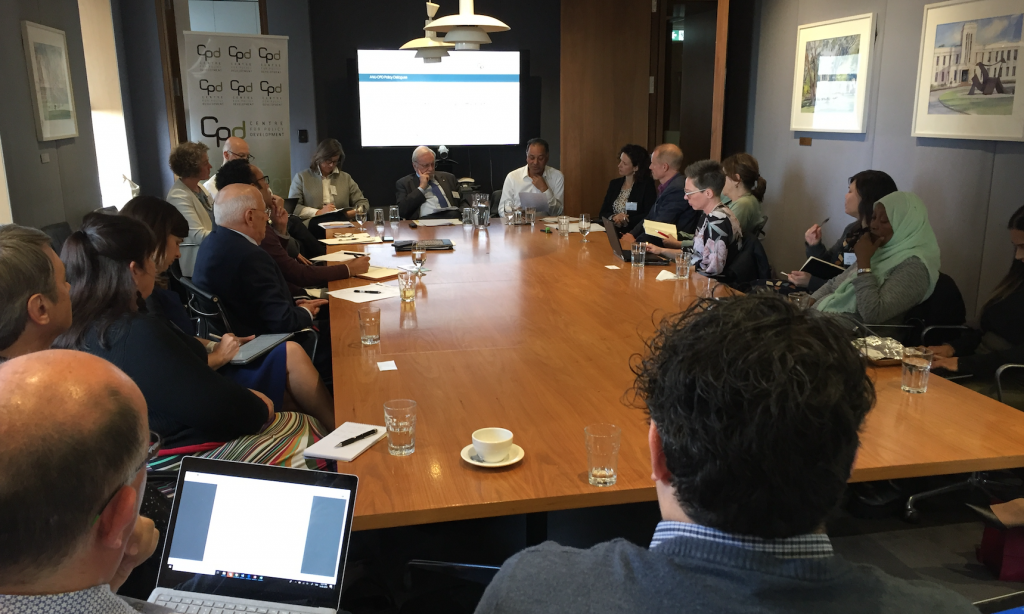
On 14 May, we hosted our second ANU-CPD Policy Dialogue for 2019 on the future of humanitarian settlement. The event featured opening remarks from Abul Rizvi (Former Senior Official, Commonwealth Department of Immigration), Kate O’Malley (Senior Policy Advisor to the UNHCR Multi-Country, Representation in Canberra), Paris Aristotle AO (CEO, Victorian Foundation for Survivors of Torture) and Lisa Button (Senior Project Manager, Centre for Policy Development).
The roundtable was hosted and moderated by ANU Chancellor and former Foreign Minister, the Hon Gareth Evans AC QC, and brought together 25 leaders from government, business, civil society and academia including a number of individuals with relevant lived experience.
It’s a pivotal time for Australia’s approach to humanitarian settlement. Last year’s review of employment services was followed closely by a review led by Peter Shergold AC into Integration, Employment and Settlement Outcomes for Refugees and Humanitarian Entrants. Research by CPD has highlighted the enormous benefits for individuals, families and Australian society if we can help refugees to settle better, find sustainable employment and/or start businesses in Australia.
Ahead of the federal election, this Policy Dialogue explored current challenges and opportunities in domestic settlement policy as well as the need to better connect domestic settlement policy and programming to a more proactive approach to displacement in the region.
Discussion
Abul Rizvi opened the discussion by highlighting current policy challenges affecting the three major groups of humanitarian migrants in Australia – the legacy caseload, asylum seekers arriving by air and those who come to Australian under the offshore humanitarian program. He highlighted challenges that come from separating the immigration function from settlement services; the challenges of the regional settlement agenda; the opportunities offered by community sponsorship; and issues relating to citizenship and spouse visa applications (which affect humanitarian migration).
Kate O’Malley provided background on the global context of resettlement needs, drawing on her experience working in Geneva and recently returning to Australia. She also highlighted some of the now lost nuance around humanitarian migration as distinct from resettlement of refugees referred through UNHCR processes. She explained that Australia has a long tradition as a resettlement country, but despite the increase in the program, the quota for UNHCR referred refugees is now at its lowest. This contrasts with a number of other countries where humanitarian migration programs are exclusively concerned with the resettlement of UNHCR referred refugees. She expressed concerns about the missed opportunity inherent in the design of Australia’s current community support program and the potential opportunities offered by reform in this area.
Paris Aristotle AO focussed on what a good structure for Australia’s settlement program might look like, and how we might link the aspiration of having a world-best settlement to how we think about settlement in Australia. He analysed the impact of the ‘mainstreaming’ of key services used by refugees and the need for services that are more integrated and tailored for the specific requirements of humanitarian migrants (as distinct from other users of relevant mainstream services like employment and language services). He also shared thoughts on how Australia might connect a bigger focus on displacement in the region to our domestic approach to settlement.
Lastly, Lisa Button addressed challenges and opportunities in settlement policy at the local and community level. She provided insights in relation to the challenges of economic participation for humanitarian migrants drawn from CPD’s Cities & Settlement (CSI) initiative. This includes the idea of using long-term ‘community deals’ to harness federal, state and local efforts towards shared goals that are sufficiently flexible to address local conditions, as well as the need for a stronger centre of gravity on settlement policy in Canberra. She outlined the need for interventions that assist humanitarian migrants to develop greater social capital and the role that community sponsorship can play in encouraging greater community understanding of and engagement with newly-arrived refugees.
The following discussion touched on:
- The biggest opportunities after the election and potential opportunities to achieve greater policy coordination and coherence in Canberra.
- The role of ‘complementary migration pathways’ in supplementing traditional forms of resettlement.
- Why changing the narrative around the issue matters and how Australia can benefit by getting this right.
- The need to ensure that refugee communities are included in the process of shaping policy in this area.
- How Australia’s approach to humanitarian settlement might connect to a more proactive Australian approach to human displacement in the region and globally.
- Opportunities presented by the Global Compacts.
- Potential options for resolving the situation of those in Nauru and Manus Island.
Participants
Abul Rizvi (Former Senior Official, Commonwealth Department of Immigration), Annabel Brown (Program Director, Centre for Policy Development), Anthea Hancocks (CEO, Scanlon Foundation), Asher Hirsch (Senior Policy Officer at the Refugee Council of Australia), Carmel Guerra OAM (CEO, Centre for Multicultural Youth), Clifford Eberly (Social and Economic Inclusion Lead, Wyndham City Council), Dean Wickham (Executive Officer, Sunraysia Mallee Ethnic Communities Council (SMECC)), Gabby Lam (Grants Coordinator, Australian Communities Foundation), Gareth Evans AC, QC (Chancellor, ANU), James Button (Former journalist and current author at Scanlon Foundation), Jessica Del Rio (Branch Manager, Settlement Policy Branch, Commonwealth Department of Social Services), John Cameron (Founder, Talent Beyond Boundaries Australia), John Roc (Deputy Chair, Durable Solutions Working Group, APRRN), Kate O’Malley (Senior Policy Advisor to the UNHCR Multi-Country Representation in Canberra), Katrina Currie (Executive Director, Employment at Department of Jobs, Precincts and Regions, Victoria), Kerrin Benson (CEO, Multicultural Development Australia), Lisa Button (Senior Project Manager, Centre for Policy Development), Loga Chandrakumar (Director, Outcomes, Performance and Risk at Department of Health & Human Services, Victoria), Nivy Balachandran (Director of Operations and Client Services, Cultural Infusion), Paris Aristotle AO (CEO, Victorian Foundation for Survivors of Torture), Peter Mousaferiadis (CEO and Founder, Cultural Infusion), Professor Andrew Markus (Director of the Australian Centre for Jewish Civilisation), Sonja Hood (CEO, Community Hubs), Sufiur Rahman (High Commissioner, People’s Republic of Bangladesh to Australia, New Zealand and Fiji).
Speakers
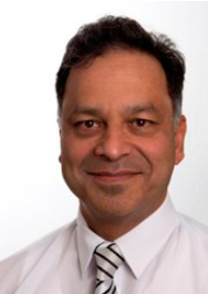
Abul Rizvi
Abul Rizvi was a senior official in the Department of Immigration from the early 1990s to 2007when he left as Deputy Secretary. He is currently doing a PhD on Australia’s immigration policies. He frequently provides media comment and opinion articles on developments in immigration policy.
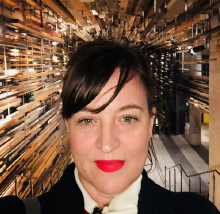
Kate O’Malley
Kate O’Malley is the Senior Policy Advisor to the United Nations High Commissioner for Refugees (UNHCR)Multi-Country Representation in Canberra.Prior to this she held two global UNHCR roles. During 2018 she was Senior Consultant on Resettlement Partnerships engaged in promoting third-country solutions for refugees to advance the Global Compact on Refugees, and between 2015 and 2017 she led UNHCR’s global Resettlement Service in its Geneva Headquarters working closely with more than 30 resettlement countries and a broad range of international stakeholders.
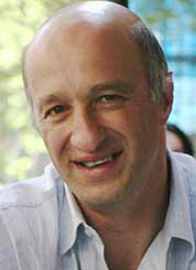
Paris Aristotle AO
Paris Aristotle AO is the Chief Executive Officer of the Victorian Foundation for Survivors of Torture Inc., also known as Foundation House. Paris has over 30 years’ experience in the field of supporting refugees and asylum seekers, particularly the provision of services to survivors of torture and trauma.
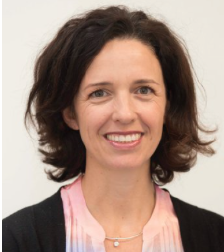
Lisa Button
Lisa is Senior Project Manager at the Centre for Policy Development. She is currently working to develop new approaches to boosting refugee economic participation in Australia, including through place-based approaches and encouraging greater employer engagement.



